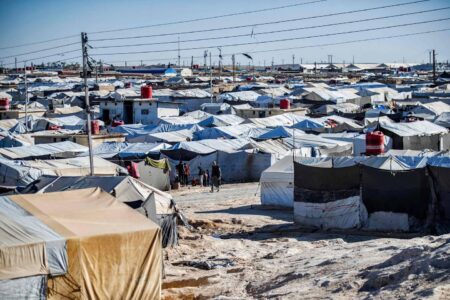
Iraqi authorities call for closure of Syria’s Al Hol camp amid killing of young citizen
An Iraqi man was shot dead in Syria’s Al Hol camp on Monday amid calls from Baghdad that it should be dismantled.
The camp, situated in Syria’s Kurdish controlled north-east, is the largest for displaced people with more than 56,000 Iraqi and Syrian refugees, some of whom have links to ISIS.
The victim was killed by a gun silencer in the camp, the British based Syrian Observatory for Human Rights said.
Authorities said the body has “signs of four gunshots”.
Al Hol is considered to be one the biggest overcrowded camps in the region and is controlled by the autonomous Kurdish administration and is fewer than 10 kilometres from the Iraqi border.
Iraq’s National Security Adviser, Qassem Al Araji, pressed foreign governments to repatriate their citizens from Al Hol, and urged rapid dismantlement of the camp.
“Each day that passes with the camp still there, hate grows and terrorism thrives,” Mr Al Araji said during a conference in Baghdad on Saturday.
The Iraqi official said ISIS “continues to represent a real threat at Al Hol” which in turn affects the country’s national security.
He spoke in front of UN delegates and ambassadors from the United States and France.
In January, ISIS fighters attacked a prison in the Kurdish-controlled north-eastern city of Hassakeh in attempt to free fighters loyal to the terrorist group.
It was the biggest assault conducted by ISIS in Syria.
Prisons run by the Kurdish-led Syrian Democratic Forces hold an estimated 12,000 ISIS members and the group aims to mount further operations similar to the January attack in a bid to free them, Mr Al Araji said.
As a result of the attack Iraq began building a concrete wall along the border in an effort to stop ISIS infiltration.
Mr Al Araji’s comments came as the UN envoy to Iraq, Jeanine Hennis-Plasschaert, said about 30,000 Iraqis with varying degrees of association to ISIS, including victims of the terrorist group, and others with no association at all, remain in limbo.
“Let’s face it, Al Hol is a ticking time bomb. If it goes off, it will impact not only the region but also far beyond. Defusing it should be our collective priority,” she said.
“Keeping people indefinitely in the restricted and poor conditions of these camps ultimately creates greater protection and security risks than taking them back in a controlled manner,” she said during the conference.
Ms Hennis-Plasschaert said three out of five residents of Al Hol are under 17, while one in five is under 5 years of age.
“These innocent children have only ever known this harsh environment, many of them are being denied the most basic rights, including education,” she said.
The UN official gave a warning about the grave dangers these children can present to Iraq and the region if left unattended.
“The legacy of yesterday’s fight against ISIS could very easily turn into tomorrow’s war, that we should not wait for young children to become of age in a camp like Al Hol,” she said.
Iraq declared victory against ISIS in late 2017 but fighters loyal to the group have continued to conduct attacks across the country.
Source: The National News





